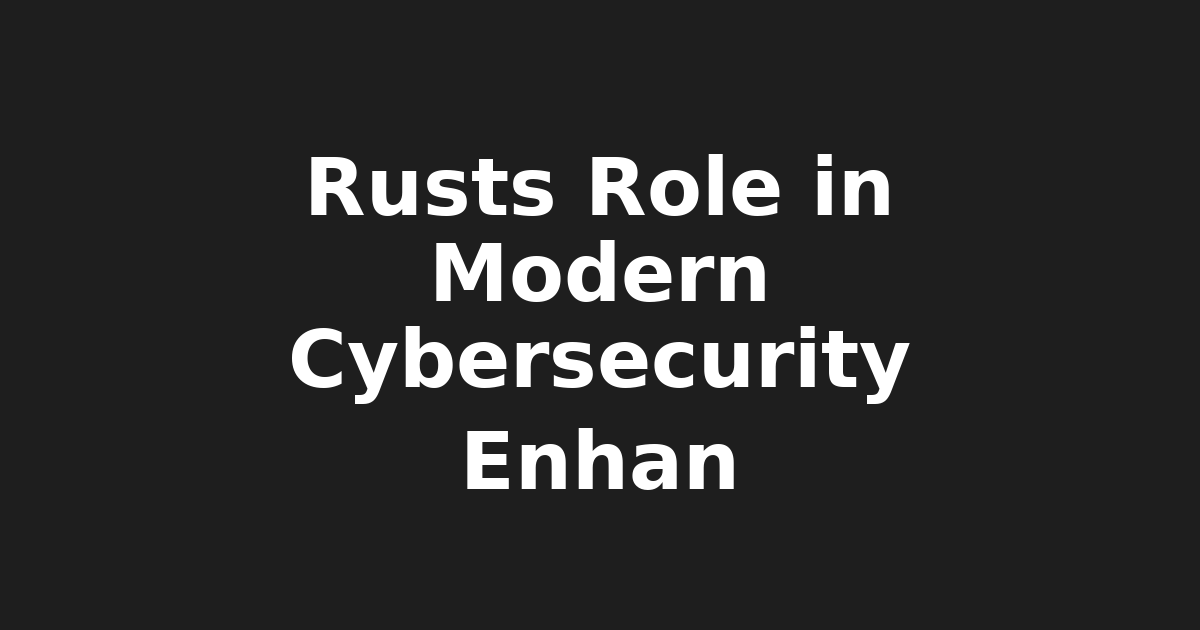Title: Harnessing Rust's Power in Modern Cybersecurity: A Look at Robust…

Hey Tech Enthusiasts! 👋, Josh from KeepItTechie here!
In today's digital world, cyber threats are lurking around every corner, waiting to pounce on the slightest vulnerability. As tech-savvy folks, we always seek robust solutions to fortify our systems. Today, I want to delve into a unique solution that's causing quite a stir - Rust Programming Language!
Rust (not to be confused with the iron oxide) is an open-source programming language focusing on memory safety and performance. It's gaining popularity in the cybersecurity community due to its remarkable features that address common vulnerabilities prevalent in other languages. 🔒
Why Rust in Cybersecurity? 🌐
You might be wondering, "Why Rust for cybersecurity?" Well, let me break it down for you! Rust provides zero-cost abstractions that guarantee memory safety without requiring a garbage collector. This feature alone is a game-changer, as memory errors such as buffer overflow and use-after-free are notorious for being exploited by cybercriminals.
Moreover, Rust's emphasis on concurrency makes it a top choice for building high-performance, secure systems. Concurrency allows multiple tasks to be executed concurrently, reducing latency and improving the overall system performance—a must in today's fast-paced digital landscape! 🚀
Rusting Your Cybersecurity Skills 🛡️
Now that we know why Rust is a superhero in the cybersecurity world, let's talk about how you can jump on board. Whether you're a developer, system administrator, or IT professional, here are some tips to get started with Rust:
- Learn the Basics: Start by familiarizing yourself with Rust's syntax and concepts using resources like The Rust Programming Language book (also known as "The Book") and Rust By Example.
- Practice Coding: Implement simple projects, such as a web server or a command-line tool, to get comfortable with the language.
- Contribute to Open Source Projects: Join the Rust community by contributing to existing open-source cybersecurity projects on GitHub. This will help you gain real-world experience and expand your network within the industry.
- Stay Updated: Keep yourself informed about the latest developments in the Rust ecosystem by following official channels, such as the Rust blog, Twitter, or the Rust forum.
Rusty Cybersecurity Projects to Watch 💻
Wondering which Rust-based cybersecurity projects you should consider for your next project or contribution? Check out these popular ones:
- RustCrypto: A collection of cryptography libraries and tools in Rust.
- Tauri: Build desktop applications with web technologies using Rust for added security.
- Convergence: An open-source, secure operating system built entirely in Rust.
- Serenity: A modern Rust library for the Discord API.
- Secret Network: A blockchain network designed to protect sensitive data with secure computation and privacy-preserving smart contracts.
Wrapping Up 🎁
Rust's memory safety, performance, and concurrency features make it an ideal choice for cybersecurity projects in today's digital age. As a tech enthusiast, understanding Rust will set you apart from the crowd, offering new opportunities to contribute to the cybersecurity landscape.
So, don't be afraid to step out of your comfort zone and explore the world of Rust—you might just find your next big project or discovery! 💪 Remember: The more tools in your arsenal, the better equipped you'll be to combat those pesky cyber threats. Until next time, keep it techie! 💻🚀🌐
Disclaimer: This article is intended for educational purposes only and does not constitute professional advice. Always ensure you have the necessary skills and supervision before implementing any concepts discussed herein in a production environment.
🙋♂️ This post was brought to you by Josh from KeepItTechie — helping you break into tech, one command at a time.
